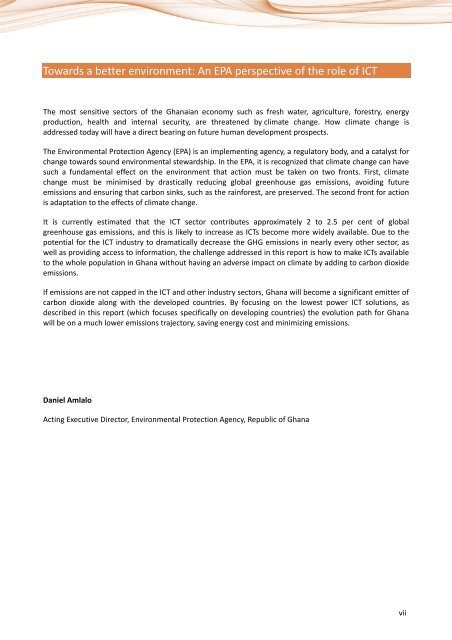Information and communication technologies (ICTs) and ... - ITU
Information and communication technologies (ICTs) and ... - ITU
Information and communication technologies (ICTs) and ... - ITU
Create successful ePaper yourself
Turn your PDF publications into a flip-book with our unique Google optimized e-Paper software.
Towards a better environment: An EPA perspective of the role of ICT<br />
The most sensitive sectors of the Ghanaian economy such as fresh water, agriculture, forestry, energy<br />
production, health <strong>and</strong> internal security, are threatened by climate change. How climate change is<br />
addressed today will have a direct bearing on future human development prospects.<br />
The Environmental Protection Agency (EPA) is an implementing agency, a regulatory body, <strong>and</strong> a catalyst for<br />
change towards sound environmental stewardship. In the EPA, it is recognized that climate change can have<br />
such a fundamental effect on the environment that action must be taken on two fronts. First, climate<br />
change must be minimised by drastically reducing global greenhouse gas emissions, avoiding future<br />
emissions <strong>and</strong> ensuring that carbon sinks, such as the rainforest, are preserved. The second front for action<br />
is adaptation to the effects of climate change.<br />
It is currently estimated that the ICT sector contributes approximately 2 to 2.5 per cent of global<br />
greenhouse gas emissions, <strong>and</strong> this is likely to increase as <strong>ICTs</strong> become more widely available. Due to the<br />
potential for the ICT industry to dramatically decrease the GHG emissions in nearly every other sector, as<br />
well as providing access to information, the challenge addressed in this report is how to make <strong>ICTs</strong> available<br />
to the whole population in Ghana without having an adverse impact on climate by adding to carbon dioxide<br />
emissions.<br />
If emissions are not capped in the ICT <strong>and</strong> other industry sectors, Ghana will become a significant emitter of<br />
carbon dioxide along with the developed countries. By focusing on the lowest power ICT solutions, as<br />
described in this report (which focuses specifically on developing countries) the evolution path for Ghana<br />
will be on a much lower emissions trajectory, saving energy cost <strong>and</strong> minimizing emissions.<br />
Daniel Amlalo<br />
Acting Executive Director, Environmental Protection Agency, Republic of Ghana<br />
vii

















